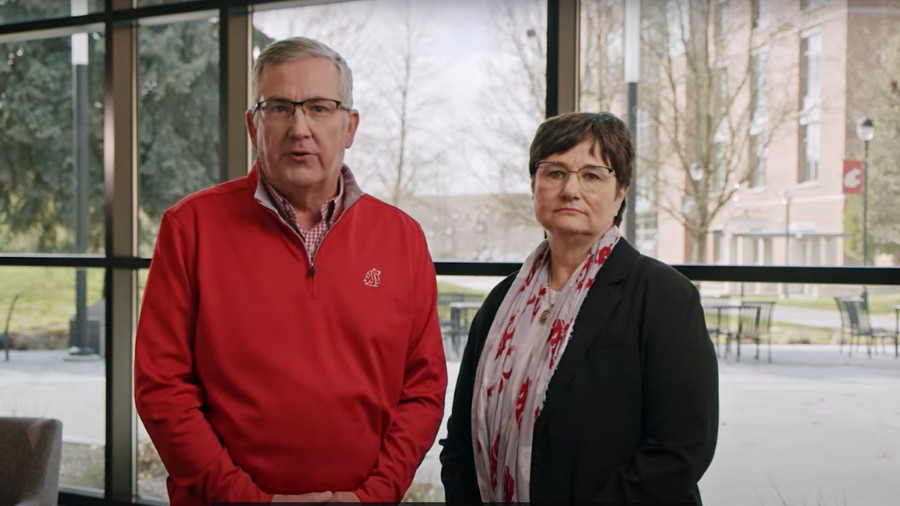Advocacy group says people with disabilities could get denied COVID-19 treatment
Mar 25, 2020, 9:16 AM

A nurse at a drive up COVID-19 coronavirus testing station set up by UW Medicine. (AP Photo/Ted S. Warren)
(AP Photo/Ted S. Warren)
If scarce resources force doctors to make life-and-death decisions in the coronavirus pandemic, what happens to those living with disabilities?
One advocacy group believes an adult with cystic fibrosis or Down syndrome could be effectively sentenced to death.
Disability Rights Washington filed a complaint with the federal government this week after plans for scarcity of resources were released by the Washington State Department of Health in conjunction with the Northwest Healthcare Regional Network, and by the University of Washington Medical Center. DRW finds these plans to be discriminatory and dangerous to individuals with disabilities.
If a person with a disability contracts coronavirus and hospitals do not have enough resources to treat everyone, then the person “may be de-prioritized in getting treatment,” said David Carlson, director of advocacy for DRW.
Ebola drug successful for another Washington coronavirus patient
“Someone who didn’t have one of those [disabilities] but still got sick may be seen as having a better upside,” he explained.
The plans state that patients’ health and age should be considered when deciding to whom to distribute resources, prioritizing those who have the greatest chance of surviving and living many more years.
The Department of Health plan directs medical professionals, when determining whether a patient should be admitted to intensive care or sent to palliative care, to “consider loss of reserves in energy, physical ability, cognition and general health.”
The UW Medical Center plan states the following:
The standard construct for medical resource allocation in time of scarcity is based upon a utilitarian framework, often stated as making decisions that provide the greatest good for the greatest number. It is worth noting that this stance differs from the standard approach of clinicians, who see their ethical obligation as advocating for and prioritizing the care of a particular patient.
Greatest good, in a protracted clinical situation such as the COVID-19 outbreak, is generally considered maximizing survival of patients with COVID-19 within the institution and the region. Overall survival may be further qualified as healthy, long-term survival, recognizing that this represents weighting the survival of young otherwise healthy patients more heavily than that of older, chronically debilitated patients. Such weighting has general support in medicine and society-at-large.
Carlson said that this creates “an opportunity to bring in lots of assumptions about quality of life” and length of life, when in reality, no one knows how long anyone will live.
“In these times, we need to be committed to our civil rights, and not adopt other methods of determining value in people, such as philosophical utilitarianism,” Carlson said.
For example, Carlson pointed to a 28-year-old Seattle woman with cystic fibrosis, a genetic disease affecting the lungs and causing a life expectancy of middle age. She is very healthy and has never been hospitalized for her condition, but fears that on paper, doctors may assume she has little time left to live and is not worth saving.
While neither plan explicitly states that a person with disabilities would be passed over for care, Carlson believes the wording was left vague intentionally.
“What worries me is, you leave it squishy, knowing how it could be used in a squishy manner, so you don’t have to own how it’s actually used,” Carlson said. Instead, “you could be clear, [say], ‘We’re not going to use this against people with disabilities.'”
DRW is calling on the U.S. Department of Health & Human Services’ Office of Civil Rights to direct the state to clearly declare that those with disabilities will be safe from discrimination. In place of a utilitarian system, DRW suggests people be treated on a first-come, first-served basis, or a lottery system.
Throughout history, people with disabilities have faced discrimination for how they were born — and in some cases, this has been fatal. The eugenics trend of the early 20th century held that people with disabilities were lesser human beings who detracted from society and did not deserve to live among the general populace. As a result, they were often put into institutions.
Luckily, society has come a long way in the past 50 years, but Carlson said that even now, people with disabilities are already routinely discriminated against in everyday health care. This can mean getting passed over for a transplant, for example. He worries what extremes this could be taken to if the COVID-19 situation becomes much more dire.
“Life is not math,” he said. “We need to figure out how to honor the policies we’ve laid out for decades around anti-discrimination.”
The Washington State Department of Health did not respond to a request for comment at press time. The story will be updated if a response is received.













